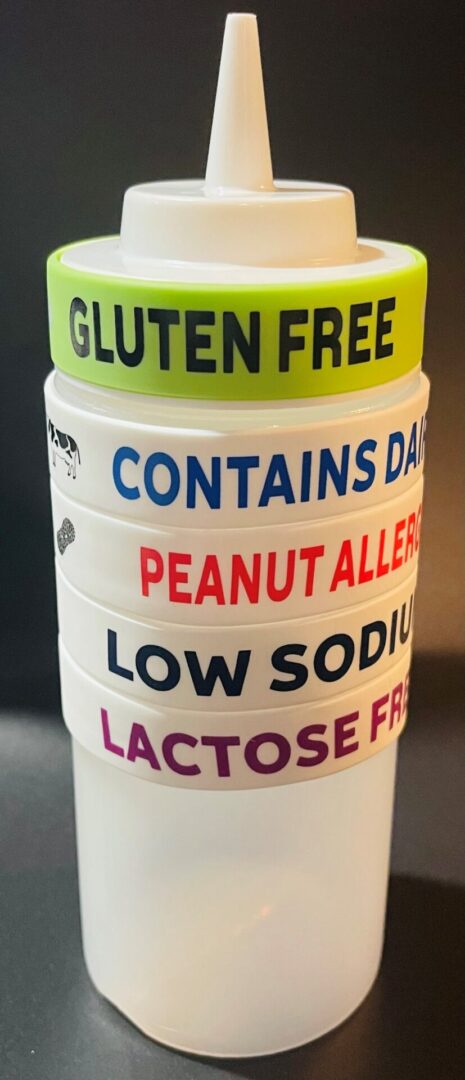The Importance of Labeling Allergens in Foodservice

The Importance of Labeling Allergens in Restaurants
In today’s world, diners are more conscious than ever about what they’re consuming. With food allergies on the rise and dietary restrictions becoming increasingly common, restaurants have a responsibility to ensure that their patrons can enjoy a safe dining experience. One of the most crucial ways to achieve this is through proper labeling of allergens.
1. Protecting Customers’ Health and Safety
Food allergies are a serious concern. For individuals with allergies to common ingredients like peanuts, shellfish, dairy, or gluten, even a small exposure can result in severe, life-threatening reactions such as anaphylaxis. Clearly labeling allergens on menus, food containers, and ingredient lists helps prevent accidental ingestion and protects the well-being of customers.
By highlighting the presence of allergens, restaurants provide customers with the information they need to make informed decisions about their food choices, potentially preventing allergic reactions that could lead to medical emergencies.
2. Building Trust and Confidence with Customers
Transparency builds trust. When a restaurant takes the extra step to clearly label allergens, it shows a commitment to customer care. Diners with food allergies or intolerances will feel more confident and comfortable dining at an establishment that prioritizes their safety.
Word of mouth is powerful, and allergen-conscious diners are more likely to recommend restaurants that cater to their needs. By creating a safe environment, restaurants can tap into a loyal customer base and foster repeat business.
3. Compliance with Food Safety Regulations
In many countries, food safety laws require restaurants to provide accurate information about allergens in their food. The U.S. Food and Drug Administration (FDA), for instance, mandates the labeling of major allergens such as milk, eggs, fish, shellfish, tree nuts, peanuts, wheat, and soybeans. Similarly, the European Union’s allergen regulations require food businesses to identify and label 14 specific allergens.
Failing to properly label allergens can lead to fines, legal action, and damage to a restaurant’s reputation. By adhering to regulations and implementing comprehensive allergen labeling practices, restaurants not only avoid legal trouble but also demonstrate a commitment to safety and professionalism.
4. Improving Staff Knowledge and Communication
Clear allergen labeling also benefits restaurant staff. When ingredients are labeled correctly, it becomes easier for servers, kitchen staff, and management to communicate with customers about potential allergens in their meals. This helps avoid any misunderstandings or mistakes that could lead to cross-contamination or accidental allergen exposure.
Proper labeling also empowers staff to answer questions confidently and quickly, improving customer service and overall efficiency in a busy restaurant environment.
5. Catering to a Growing Market
More people are becoming aware of food sensitivities and dietary preferences. According to the Centers for Disease Control and Prevention (CDC), food allergies among children have increased by about 50% from 1997 to 2011. This growing population of allergen-sensitive individuals represents a significant market opportunity for restaurants.
By clearly labeling allergens, restaurants can appeal to a wider audience, including those with allergies, intolerances, and specific dietary preferences (like gluten-free or dairy-free). This inclusivity can lead to more customers and increased sales.
6. Preventing Cross-Contamination
Proper allergen labeling doesn’t just benefit customers; it also helps restaurant kitchens avoid cross-contamination. When ingredients are labeled clearly, kitchen staff are more likely to handle food with care, keeping allergen-containing items separate from allergen-free dishes. This reduces the risk of accidental contamination, which is particularly important for people with severe allergies.
Conclusion
Labeling allergens in a restaurant is more than just a safety precaution—it’s a business imperative. By protecting customer health, complying with regulations, building trust, and enhancing staff communication, restaurants can create a safer, more inclusive dining experience. In today’s competitive market, attention to allergen labeling can set a restaurant apart and contribute to long-term success.
Our new Allergen Bands are the perfect solution to making sure your customers are safe!
